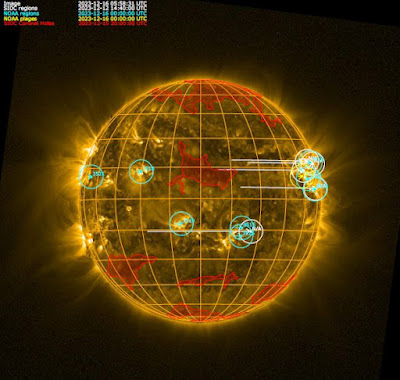Together with my collegue Walter, I wll be talking our Sol'Ex project next thursday December 21, 2023 @ VVS Capella in Hoegaarden.
Pascal Hilkens Astro Home Page
Saturday, December 16, 2023
Latest Solar Maps and images on the internet
The latest Solar images and maps with all kind of information can be found on the internet. But where?
I made an overview of some interesting websites (but without being complete).
Sunday, December 3, 2023
My blogpost number 2000! Celebrating with a Halo
Yes, this is my 2000nd blogpost since I started back in december 2011! And I'm celebrating with a halo around the Sun.
Saturday, December 2, 2023
Spectral Lines of Hydrogen, Calcium II H&K and Helium I (D3)
In astronomy ionization of atoms are noted different then in chemistry
Neutral Hydrogen : H I
Neutral Helium : He I
Neutral Calcium : Ca I
Ionized Calcium : Ca II or Ca+ (noted in chemistry)
Clarification of spectral lines of Hydrogen (H I)
For neutral Hydrogen or H I :
Lyman series : transition to groundlevel
Balmer series : transition to energy level 2; all transitions are within visible wavelenght
Paschen series : transition to energy level 3
Brackett series : transition to energy level 4
Pfund series : transition to energy level 5
Humphreys series : transition to energy level 6
Hansen-Strong series : transition to energy level 7
587,5545nm 1s3d 3D1 – 1s2p 3P2
Calcium electron configuration : 1s2 2s2 2p6 3s2 3p6 4s1
Lyman series : transition to groundlevel
Balmer series : transition to energy level 2; all transitions are within visible wavelenght
Paschen series : transition to energy level 3
Brackett series : transition to energy level 4
Pfund series : transition to energy level 5
Humphreys series : transition to energy level 6
Hansen-Strong series : transition to energy level 7
The H-alpha line is due to an electron making a transition between energy level 3 to energy level 2.
Clarification of Helium I (D3) lines
He I (D3) line - 587,572nm via Ortho Helium 1s3d to 1s2p but more in detail :
587,5561nm 1s3d 3D2 – 1s2p 3P2
587,5562nm 1s3d 3D3 – 1s2p 3P2
587,5571nm 1s3d 3D1 – 1s2p 3P1
587,5588nm 1s3d 3D2 – 1s2p 3P1
587,5913nm 1s3d 3D1 – 1s2p 3P0
Clarification of Ca II H and K line
Ca II H line : 396.847nm
Ca II K line : 393.366nm
Tuesday, November 28, 2023
Comet 12P/Pons-Brooks
It's been a while since I set up my telescope for DSO. This evening I took my chance and made some images of Comet 12P/Pons-Brooks. Comet 12P/Pons-Brooks is a Halley-type periodic comet that was first discovered by Jean-Louis Pons on July 12, 1812 and then independently rediscovered by William Robert Brooks in 1883. It's period is about 71.3 years. Maximum brightness is foreseen during the month of April with the potential to see the comet during the solar eclips of April 8th 2024.
Setting:
TLAPO80/480 f/6 with ASI2600MC
Filter Optolong L-Pro
Exposure: 5x60s & 2x180s
Software : SharpCap4, APP, CS4, Denoise AI
Sunday, November 26, 2023
Cardinal Librarian de Zelada @ Vatican Museum - Time the Sun takes to pass across the Sundial
 |
| Pair of shutters in Vatican Museum (Pascal Hilkens) |
This pair of painted shutters pertaining to the original windows of the "Sundial Gabinet" show a list of days, months,sun diameter and the time the sun takes to pass across the sundial in seconds and minutes.
This of course took my interest and I started to make my own calculations in order to compare with the data on the shutters. The easiest formula I found :
Time (seconds) to pass across the meridan line = 128 / cos(delta)
delta = declination of the sun at a specific day = cos ((360/365)*(N+10))*-23.7333
N = day of the year starting at january 1
The results of both my calculation as of the shutters are shown in the graph below and are quit comparable.
The below marble sundial with bronze inlays was originally embedded in the pavement of the Vatican "Sundial Gabinet" which was the apartment of Cardinal Librarian Francesco Saverio de Zelada (1717-1801) who live here from 1780 till 1798. Only this piece did survive.
 |
| Marble Sundial Vatican Museum (Pascal Hilkens) |
Friday, November 24, 2023
My name with Europa Clipper to Jupiter's Icy moon Europa
My name will fly on the Europa Clipper spacecraft as it travels 2.89 billion km on its voyage to Jupiter’s exploring the Icy moon.
See also https://europa.nasa.gov/
Subscribe to:
Comments (Atom)
















